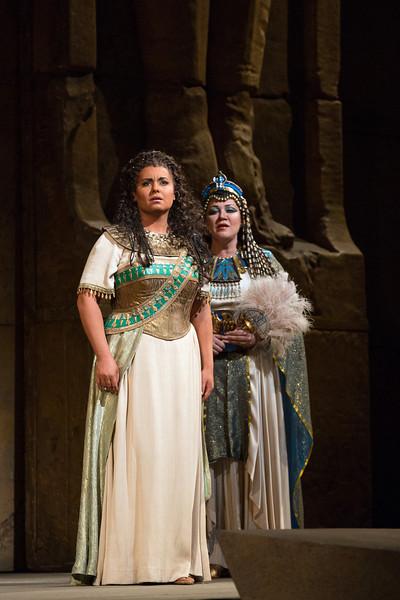Soprano makes impressive debut in Met’s “Aida”

Liudmyla Monastyrska as the title character and Olga Borodina as Amneris in Verdi’s “Aida.” Photo: Marty Sohl
A staple in the Metropolitan Opera’s warhorse repertoire since 1988, Sonja Frisell’s production of Aida continues to serve one primary function—as an annual measurement of the current state of Verdi singing. Without much in the way of insightful staging or artistic innovation, the main attraction is to see how this year’s Aida cast measures up. Unlike the Robert LePage production of Wagner’s Ring, no one left the theater on Friday night discussing the interpretation of the piece.
Two singers as disparate as the characters they embodied took on the starring roles—Carl Tanner (replacing an indisposed Marco Berti) as Radames and Liudmyla Monastyrska as Aida, a Ukranian soprano who is already a celebrity in her native Kiev.
Making her highly anticipated Met debut, Monastyrska started out tentatively in Act I. Thankfully she delved into the character of the Ethiopian princess vocally by the pivotal latter acts, delivering riveting pianissimos in O patria mia. With a voice that is at agile while still dark and opulent, she is primed to be a leading Verdian soprano. She ran into a little vocal trouble during the Act III duet with Radames, but recovered admirably. Dramatically, her interpretation of the Ethiopian princess proved a bit static and uninspired but her stagey hand gestures were compensated for by her vocalism.
Tanner, who debuted at the Met in 2010 as Dick Johnson in La Fanciulla del West, sang his role with confidence and virility. A former truck driver and bounty hunter (no joke), Tanner’s tone is Italianate and beautiful with high notes that were expressive and blooming, opening with a Celeste Aida that sounded effortless, eliciting a chorus of “bravos.” Tanner looks and sounds like a real star in the making, with a backstory that makes him as interesting of a character offstage as on. One only wished the staging would have allowed Tanner to further explore his characterization, but that may have been due to the last-minute substitution and short rehearsal time.
Olga Borodina’s Amneris was practically flawless. Her voluptuous mezzo was powerful and substantive in the middle and lower registers, her chest voice particularly impressive, which is crucial for this role. A highlight of the opera was the Act II duet between the two women dueling for Radames’ love. The only moments her elegant characterization of the Egyptian princess faltered was in reaching for her upper register with effortful high notes. Her judgement scene was riveting and honest in emotion.
Alberto Mastromarino made a particularly impressive and credible Amonasro, with an imposing delivery of his entrance scene with the Ethiopian slaves. His tone resembles Sherrill Milnes in his prime, a perfect Verdi baritone with squillo and resounding F’s and G’s.
Stefan Kocan’s Ramfis proved resounding, though vocally fuzzy at times with a brittle top register. Miklos Sebestyen and Hugo Vera sang well as as the King and the Messenger, respectively. Lindemann Young Artist alumna Jennifer Check was vocally serviceable as the off-stage Priestess.
The Metropolitan Opera Chorus, under the direction of Donald Palumbo, performed the well-known Verdian set pieces with nuance and a wide range of contrast in both dynamic and color. The delicate maneuvering between the off-stage and on-stage choruses was seamless and musical. Fabio Luisi’s elegant and riveting conducting provided supportive and inspirational musical direction.
For all its tradition, Sonja Frisell’s production as a whole, works because of its pageantry and grandeur, with Gianni Quaranta’s imposing set design particularly effective in the heartbreaking final scene with Radames and Aida embracing in the tomb as Amneris prays above them. The live horses paraded on stage during the triumphal chorus received their own applause, though at least one horse seems a bit perturbed about being there.
Aida runs through Dec. 28th. metopera.org
Posted Nov 30, 2012 at 2:48 pm by kitty
“Without much in the way of insightful staging or artistic innovation, the main attraction is to see how this year’s Aida cast measures up. Unlike the Robert LePage production of Wagner’s Ring, no one left the theater on Friday night discussing the interpretation of the piece.”
Some of these “insightful staging or artistic innovation” HURT rather than help our appreciation of the actual opera as they put emphasis on the “work” of director – often of dubious talent – for the work of a genius such as the composer. Why does everything need to be interpreted or re-thought? Opera is MUSIC FIRST, and people should indeed be discussing music and singing when leaving an opera house. These days there are often one paragraph dedicated to singers and two pages about nonsense introduced by a director.
When I go to opera for Aida, I want to hear and see Verdi’s Aida. When I go to opera for the Ring, I want Wagner Ring not Lepage Ring. And pray explain to me what for example Rigoletto set in Las Vegas has to do with the main topic of both Verdi’s opera and Hugo’s play i.e. abuse of power?
I enjoyed Aida very much yesterday because it was what opera should be about – glorious singing. Yes, drama is important and maybe if singers acted a little better it’d be even greater, but I loved beautiful sets. I WANT VISUAL BEAUTY in opera to match the beautiful music. I don’t want modern ugly sets or costumes/updating that makes libretto totally meaningless. Some of us actually understand Italian.